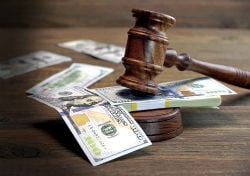Nearly five years ago, US lawmakers agreed to carry out a comprehensive review of United States copyright law.
In the following years, the House Judiciary Committee held dozens of hearings on various topics, from DMCA reform and fair use exemptions to the possibility of a small claims court for copyright offenses.
While many of the topics never got far beyond the discussion stage, there’s now a new bill on the table that introduces a small claims process for copyright offenses.
The CASE Act, short for Copyright Alternative in Small-Claims Enforcement, proposes to establish a small claims court to resolve copyright disputes outside the federal courts. This means that legal costs will be significantly reduced.
The idea behind the bill is to lower the barrier for smaller copyright holders with limited resources, who usually refrain from going to court. Starting a federal case with proper representation is quite costly, while the outcome is rather uncertain.
While this may sound noble, digital rights groups, including the Electronic Frontier Foundation (EFF) and Public Knowledge, warn that the bill could do more harm than good.
One of the problems they signal is that the proposed “Copyright Claims Board” would be connected to the US Copyright Office. Given this connection, the groups fear that the three judges might be somewhat biased towards copyright holders.
“Unfortunately, the Copyright Office has a history of putting copyright holders’ interests ahead of other important legal rights and policy concerns. We fear that any small claims process the Copyright Office conducts will tend to follow that pattern,” EFF’s Mitch Stoltz warns.
The copyright claims board will have three judges who can hear cases from all over the country. They can award damages awards of up to $15,000 per infringement, or $30,000 per case.
Participation is voluntary and potential defendants can opt-out. However, if they fail to do so, any order against them can still be binding and enforceable through a federal court.
An opt-in system would be much better, according to EFF, as that would prevent abuse by copyright holders who are looking for cheap default judgments.
“[A]n opt-in approach would help ensure that both participants affirmatively choose to litigate their dispute in this new court, and help prevent copyright holders from abusing the system to obtain inexpensive default judgments that will be hard to appeal.”
While smart defendants would opt-out in certain situations, those who are less familiar with the law might become the target of what are essentially copyright parking tickets.
“Knowledgeable defendants will opt out of such proceedings, while legally unsophisticated targets, including ordinary Internet users, could find themselves committed to an unfair, accelerated process handing out largely unappealable $5,000 copyright parking tickets,” EFF adds.
In its current form, the small claims court may prove to be an ideal tool for copyright trolls, including those who made a business out of filing federal cases against alleged BitTorrent pirates.
This copyright troll issue angle highlighted by both EFF and Public Knowlege, who urge lawmakers to revise the bill.
“[I]t’s not hard to see how trolls and default judgments could come to dominate the system,” Public Knowledge says.
“Instead of creating a reliable, fair mechanism for independent artists to pursue scaled infringement claims online, it would establish an opaque, unaccountable legislation mill that will likely get bogged down by copyright trolls and questionable claimants looking for a payout,” they conclude.
Various copyright holder groups are more positive about the bill. The Copyright Alliance, for example, says that it will empower creators with smaller budgets to protect their rights.
“The next generation of creators deserves copyright protection that is as pioneering and forward-thinking as they are. They deserve practical solutions to the real-life problems they face as creators. This bill is the first step.”
 Nearly five years ago, US lawmakers agreed to carry out a comprehensive review of United States copyright law.
Nearly five years ago, US lawmakers agreed to carry out a comprehensive review of United States copyright law.



